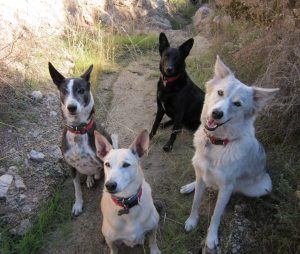
Dogs in multi-dog households need to be treated as individuals, depending on their individual likes, needs and personalities, as opposed to a collective group where they are all considered to be exactly the same. Photo © Susan Nilson
This is a subject I’ve always meant to write about and somehow it always slips my mind until the topic crops ups with another client of mine – that of comparisons. What I mean is those comparisons we make between our own dogs and other peoples’ and maybe our other dogs or previous dogs. It’s human nature of course and a lot of the time it cannot be helped, but to constantly compare, does us and our dogs a disservice.
That one ‘great dog’
All dogs are great! Sometimes though there is just that one who edges past the rest. Maybe she was just so quick to learn and train, maybe she seemed to listen to everything we said and had those empathic qualities dogs have or maybe she was just super brilliant in a certain sport. The loss of any dog leaves a terrifically painful void but perhaps there is a greater magnification of loss with the ‘one great dog’. It’s beyond difficult when you decide to accept a new four legged family member, because each is so different and the contrast in personality may be stark.
‘Black sheep’ in the family
Comparisons also arise, not surprisingly from multi-dog households. I commonly witness treating dogs as a whole rather than singular entities with individual personalities. This proves problematic because if one dog behaves as an individual, he is deemed to have potential ‘behavioural issues’. Often owners will say to me ‘why can’t Z be more like X and Y’, then we’d have a much easier life’. The issue here is not the behaviour of Z, but the expectations of his owner to behave (unrealistically) like X and Y.
Everyone else has perfect dogs!
No they don’t! There must be hundreds of times I have heard this and this is probably one of the most harmful mis-beliefs, it is a very confidence sapping thought. When you’re struggling with a training issue; walking on the lead, calling your dog back etc. it’s very easy to look at everybody else’s dog in the park and become disheartened – they all look like the perfect dog! Believe me, everyone struggles at some point with something (I certainly have). You may be looking at the product of many hours, weeks, months, years even of hard work – it doesn’t happen instantly (contrary to the beliefs of some).
So treat your dog as an individual
Even if you’ve had the same breed for years, the same breeding line, dogs, bitches etc. it really doesn’t matter – you haven’t had this dog. What you mustn’t do is see yourself or your dog as a failure because ‘everyone else’ is succeeding – I hear this a lot. No one is a a failure, if there are some things you aren’t accomplishing, then there are reasons why not and please seek help from a qualified and accredited trainer or behaviourist. Some dogs simply take more time. Your last dog may have accomplished that perfect recall with distractions in a couple of weeks, your new dog may struggle, that’s fine. Don’t be afraid also to embrace new techniques – things move on. In the lifetime of a dog, there’s a world of change. What worked for one dog may not work for another and there may now be newer, more sophisticated advances or even more humane techniques that are much more applicable.
Listen to yourself – not others
You know your dog. It doesn’t help if you’re bombarded by outside views or beliefs or thoughts and opinions regarding how you are training or treating your dog. Listen to yourself and stick to your goals and plan. You will hear many differing (sometimes unhelpful, sometimes hurtful) comments, but the best you can do for your dog is to know him for who he is, have patience and give him time to develop and learn.
